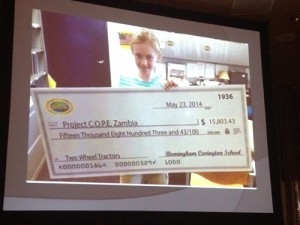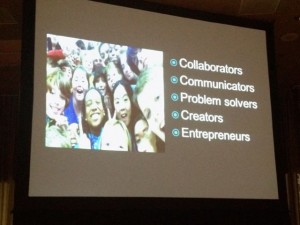Kids Solve Global Problems, Buy Tractor for Village in Zambia | ISTE 2014
The ISTE session "Teaching Kids to Harness Technology to Solve Global Problems" showed how a group of Michigan fifth and sixth graders used compassion, curiosity, and 21st-century skills to raise money and buy a tractor for a village in Zambia.

The students of Project COPE raised hope, and over $15K, to buy a two-wheel tractor for a village in Zambia.
The ISTE annual conference in Atlanta, Georgia (June 28–July 1) attracted over 16,000 educators, administrators, and technology specialists from around the world. The program included hundreds of sessions, demonstrations, workshops, and poster sessions, each showcasing technology in different ways. They included best practices, innovations, introductions to new tools and resources, and a great representation of games-based learning and gamification strategies. But one session that particularly caught my attention emphasized the value in teaching students how to learn through failure—and how to see their work impact people beyond the brick and mortar of their school. It all came down to raising funds to purchase a two-wheel tractor for a small village in Zambia. The session, entitled “Teaching Kids to Harness Technology to Solve Global Problems,” was led by fifth/sixth grade teachers Pauline Roberts and John Kernan of the Birmingham Covington School (BCS) in Bloomfield Hills, Michigan. Over the course of an hour, Roberts and Kernan described a project that was ambitious, student-driven, and replicable—a recipe for student achievement through meaningful engagement and globally impactful work. I present to you a recipe for How to Buy a Two-Wheel Tractor and Change the World, as accumulated through the stories and testimonies of the teachers and students of BCS, and as recorded by this teacher librarian.How to Buy a Two-Wheel Tractor and Change the World
INGREDIENTS NEEDED: 1 Worthy Cause 3 pinches of Time 1 oz. Trust 2 shakes of Flexibility 1 cup of honest, Unfailing Belief INGREDIENTS EXPLANATIONS: Worthy Cause: No matter the focus, the cause should be something the entire class can stand behind. Time: Work can easily build upon classroom objectives and may even extend beyond the school day to independent student work. Trust: Things will most certainly get messy throughout the course of this project, but the end results will justify the means of accomplishing the goal. Flexibility: In order to facilitate the varied student-provided solutions, flexibility of resources and willingness to support students in whatever ways needed to ensure the success of their ideas will become critical. Belief in the Success and Capability of the Students: They will accomplish great things through this work, but only in an environment where they know their ideas are validated.
This session at ISTE 2014 described a charitable project that allowed a group of students to raise money for kids across the world, while also practicing their 21st-century skills.
DIRECTIONS: 1. Prepare the students. Roberts and Kernan spoke about the importance of the students feeling comfortable in what they’re doing. This ties directly into building a classroom culture of respect, safety, and risk-taking. Much of this work took place during sciracy, the content block taught at BCS that blends science (sci-) and literacy (-racy). Roberts and Kernan described a water study in which the students explored the hydrosphere through a missions-based unit called H2OHeroes. The gamified unit provided opportunities for students to build digital literacy skills independently and collaborate with their classmates. 2. Transfer prior knowledge to help solve a real-world problem. The BCS fifth/sixth graders first learned about Project COPE Zambia and specifically the Chilupula Project through their work on H2OHeroes. COPE, an acronym for "Community Action On Poverty and Environment," and the Chilupula Project are working in Zambia to support the village “with an array of services focused on creating a local economy.” When the students of BCS came across Project COPE, they saw an opportunity to apply their knowledge of the hydrosphere gained through H2OHeroes in order to help people, by raising funds to purchase an Ecodome toilet for the Zambia village. This facility relies on compost and does not require running water, helping to reduce the spread of disease within the village. Roberts and Kernan coordinated a Skype conversation between the students and George Sherman of Project COPE, currently living in Zambia. 3. Implement active listening. Following the Skype session with Sherman, the students were somewhat deflated to learn that the village already had Ecodome toilets and were no longer in need of an additional unit. It was time to re-evaluate the needs of the villagers in order for the students to make the greatest impact. Roberts said it best during the presentation: “When you want to provide services and change the world, you can’t just assume what people need. You have to be an active listener to understand what is needed to truly help.” What the village needed was a two-wheel tractor. The price tag on this item is around $12,000 US dollars, and the BCS students were determined to make it happen. 4. Identify many solutions. A two-wheel tractor would enable a greater crop yield for the farms of the village and would allow the farmers to finish their work more quickly. The tractor could also be lent to neighboring villages. It was clear this was the tool the village needed most. The students came up with a variety of ways their community could be engaged to raise awareness of their cause and to help raise the funds necessary to purchase the two-wheel tractor. Among the ideas generated were creating Project COPE t-shirts to sell, hosting a Toys for Tractors toy drive and yard sale, creating handmade jewelry, hosting a change drive during school lunches, and coding a Zambia Farm game. But this is where Roberts and Kernan made a decision to help where other teachers may have steered clear. They approved all of the projects. No matter how successful each fundraising project would be in raising funds for Project COPE, Roberts and Kernan worked tirelessly to assure that each student or student group was able to see his/her project materialized. With the teachers’ support, the BCS students harnessed those digital literacy and sciracy skills they’d mastered over the past weeks in order to solve a global problem.
It took almost 14 months for the students to reach their fundraising goal, while also building empathy and support from their community.
5. Involve the community. Roberts and Kernan invited several students to speak to the session attendees about Project COPE throughout the presentation. Much in the way these young people engaged their community to build support, each spoke to us about his or her fundraising project with a clear sense of purpose and an articulate understanding of their cause. It took the fifth/sixth graders nearly 14 months to accomplish their goal. One student remarked, “It felt good giving people hope. We kept on going because that’s what those people really needed… hope.” Witnessing the amount of empathy built throughout this project, as well as the level of endurance exhibited by these students towards their work, was a testament to good teaching. I was reminded of the great things our students are capable of accomplishing if provided the opportunity, the resources, and the support. 6. If you want to change the world, change the world. This presentation was as much about sharing student work as it was about sharing students’ attitudes toward the work. After viewing the animated video introducing the project, to seeing pictures of the fundraising projects and student testimonials over Skype, it was evident that this work couldn’t have been accomplished if it weren’t for teachers who understood how to effectively facilitate student work and culminate understanding through real-world context. It is clear that the experience changed the students’ perspective on the world and on the impact they can have on global problems. Jake, a student who Skyped with session attendees, reminded us, “Anything is possible. If you want to climb a mountain, climb a mountain! If you want to change the world, change the world!”You may also want to read:
How a VA Middle School Librarian and Her Book Club Raised Funds to Provide 15,000 Meals for Students in South Sudan
Matthew Winner is an elementary school teacher librarian in Elkridge, Md. He is a 2013 Library Journal Mover & Shaker and was named a White House Champion of Change. Matthew is the host of the popular children’s literature podcast Let’s Get Busy and the author of the Busy Librarian blog. Find Matthew online at @MatthewWinner or by visiting BusyLibrarian.com.
RELATED
RECOMMENDED
CAREERS
The job outlook in 2030: Librarians will be in demand
CAREERS
The job outlook in 2030: Librarians will be in demand
ALREADY A SUBSCRIBER? LOG IN
We are currently offering this content for free. Sign up now to activate your personal profile, where you can save articles for future viewing






Add Comment :-
Be the first reader to comment.
Comment Policy:
Comment should not be empty !!!